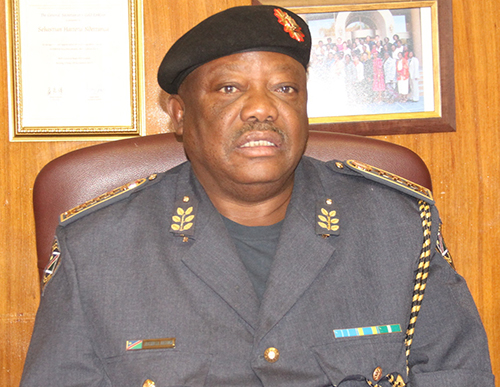Albertina Nakale
Police chief Sebastian Ndeitunga has refused to comment on why he allegedly allowed a group of former combatants of the People’s Liberation Army of Namibia to exhume the remains of nine ex-PLAN fighters at Enghadja laShikongeni village in the Ohangwena region earlier this month without a court order, as required by law. The group of war veterans, which include businessman Banda Shilimela and president of the Namibia National Liberation Veterans Association Ben Shikongo, were yesterday castigated in a statement by the Ministry of Defence and Veterans’ Affairs for carrying out the illegal act.
Veterans’ affairs spokesperson Edson Haufiku said such action is a violation of the law and an infringement on the roles and responsibilities of the ministry, as provided for in section 3 of the Veterans Act (Act No. 2 of 2008), as amended.
It mandates the Ministry of Defence and Veterans’ Affairs to ensure that the history of the liberation struggle is preserved and kept alive for present and future generations.
Subsequently, clause 2 (b) of Section 2 of the same Act obliges the ministry to preserve “anything which has any historical links with the national liberation struggle”. The ministry cited that any person acting in contravention of the provisions of the Burial Ordinance Act No. 27 of 1966 shall be guilty of an offence and shall on conviction be liable to a fine, in default of payment, to imprisonment for a period not exceeding six months, or to both such fine and such imprisonment. Although the Act stipulates that a person can be fined N$100, Haufiku explained such an amount is no longer applicable to today’s situation since the law was passed in 1966. Therefore, he said the fine will be determined by the courts.
The ministry insisted that as the enforcing arm of the laws of the country, the police must ensure that the law is adhered to, and take appropriate measures to address any violation of the country’s laws. The exhumation happened where nine PLAN fighters died in a battle against the apartheid forces at Enghadja laShikongeni village on 2 April 1989. However, the group is adamant that they were granted permission to go ahead with the exhumation by Ndeitunga, who also directed police presence at the exhumation of the remains. Shilimela, who was part of the battle on that fateful day, feels there is nothing they did wrong, except a good deed of conferring a dignified burial to their ‘comrades’ who died in combat. “I thank God that he gave me something. So, I spend N$120 000 to erect a tombstone. The ministry was supposed to be happy with what we did. The family members of these human remains are very happy about what we did. Those unmarked graves have been neglected for the past 33 years since the battle. My heart bleeds to see those unmarked graves of our comrades that we were together in a battle,” Shilimela reacted. Ndeitunga yesterday refused to comment on the issue, saying “I already answered on that issue. I don’t want to waste time,” he said before hanging up the phone. Ohangwena governor Walde Ndevashiya confirmed knowledge of the issue, saying the group sought guidance from his office on how to go about the process. He said he advised them to approach the police since it was a sensitive matter involving human remains, as his office has no mandate to deal with such issues. “The group came to my office in 2021, seeking advice on what to do in the exhumation of the remains. I told them it is not within my mandate. I channelled the letter to Ndeitunga. After some time, the letter came back, detailing procedures to follow in the exhumation of the remains. We forwarded the letter as it is to them,” he narrated. Contacted for comment yesterday, judiciary spokesperson Selma Mwaetako said the current law only authorises a magistrate to grant exhumation orders in the event that the body is needed for a forensic examination and the extraction of DNA samples for criminal cases. “If exhumation is done for the purpose of reburial, permission is obtained from the local authority council or village council in whose area of jurisdiction the gravesites are. Therefore, no application was brought before a magistrate. They do not have jurisdiction to grant orders for exhumation which is done with the aim of reburying the body,” Mwaetako clarified. Haufiku said it is the government’s commitment to accord the martyrs of the national liberation struggle dignified interment at national shrines, or as deemed appropriate. The battle at Enghadja laShikongeni took place after a ceasefire was already signed between the two warring forces under the United Nations Resolution 435, which paved the way for the independence of Namibia on 21 March 1990.
anakale@nepc.com.na
No comment… Police chief Sebastian Ndeitunga.
Photo: Nampa


